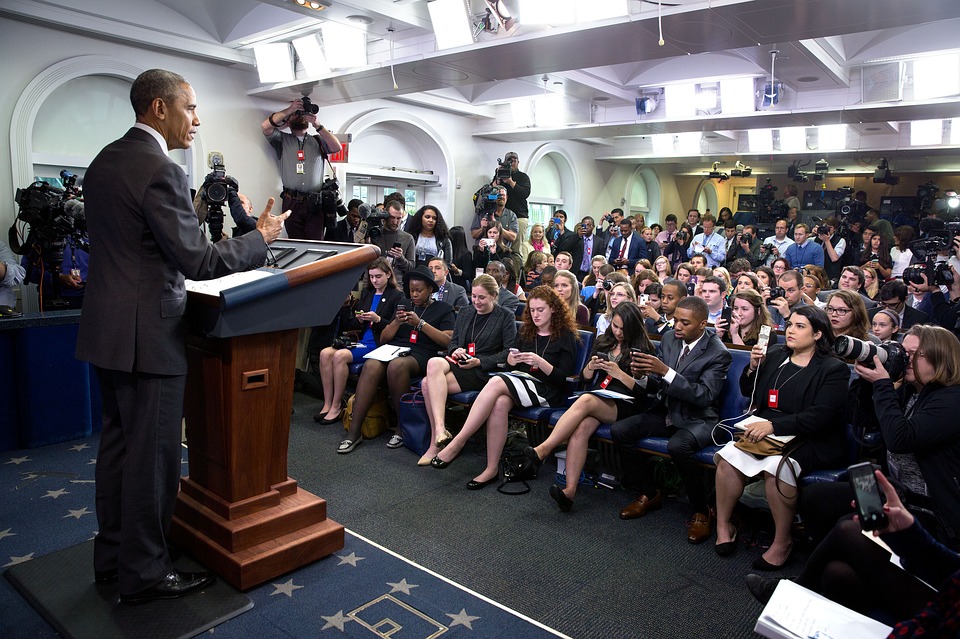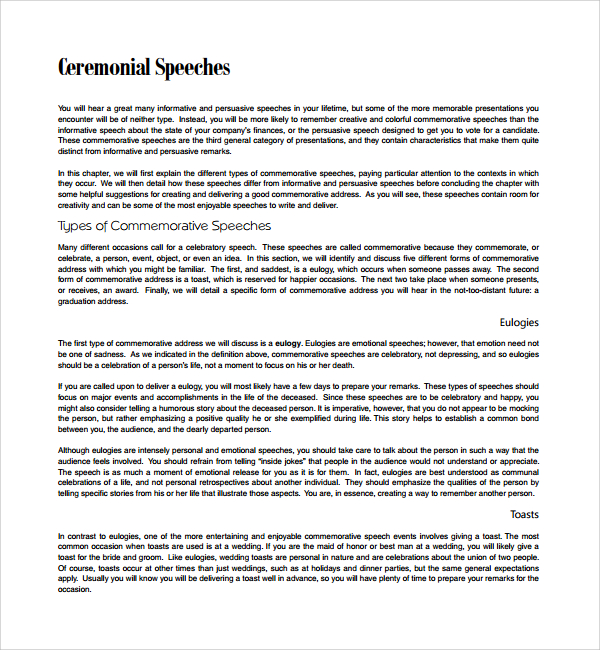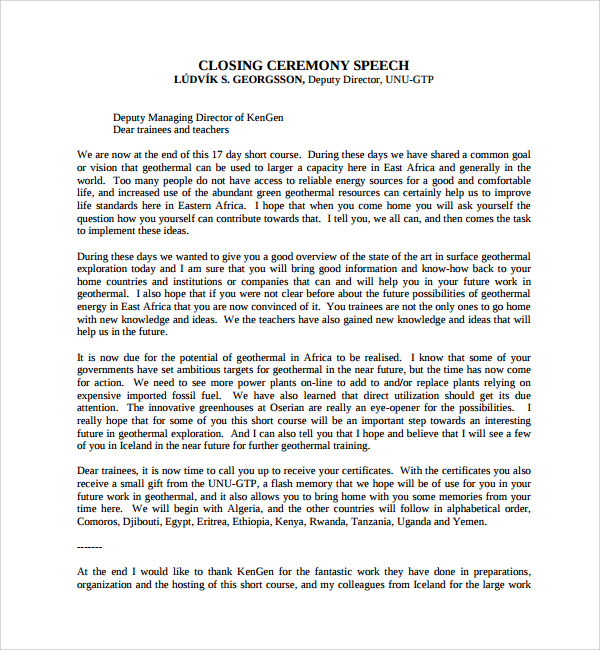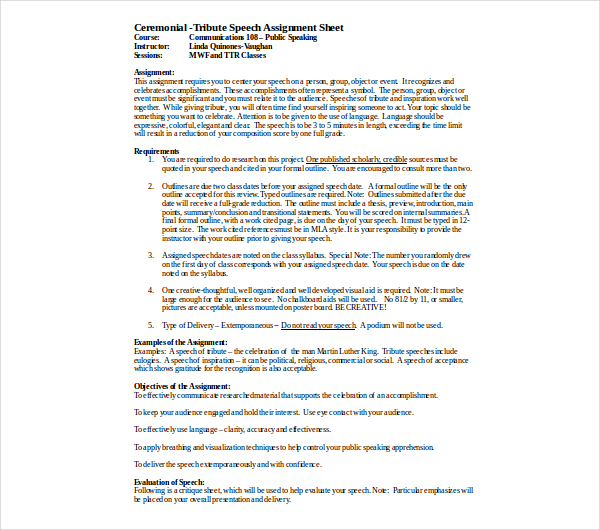Ceremonial Speech Examples to Download to Download
What is the first thing that comes to mind when you say the word ceremony? Normally, people would assume weddings, graduations, and recognition ceremonies. And they are not wrong. But there are different types of ceremonies for many different types of occasions, not only limited to the aforementioned events above. You may also see introduction speech.
What is a Ceremonial Speech?
According to Michael Gamble, one of the proponents of the book Public Speaking in the Age of Diversity, he points out that ceremonial speaking stresses the sharing of identities and values that unite people into communities. It can be said that all societies hold certain values central to human existence: beauty, loyalty, wisdom, kindness, tradition, success, innocence, experience, courage, perseverance, kindness, for instance. You may also see thank you speech.
Just like commemorative speeches, this kind of speech is “epideictic”. Events such as the eulogy, the speech of nomination, the speech of goodwill, the wedding toast, and the award acceptance speech are considered special occasions on which we celebrate and reinforce common aims, benefits, and aspirations. You may also see welcome speech.
“In many ways, special occasions are the punctuation marks of life. They are the rituals that draw us together in celebration of some person or event” Gamble (p. 385)
People gain appreciation of themselves through appreciation of their common heritage. Ceremonial speeches are not simply informative, they are the the reason on why we celebrate these events in the first place. Think of it as a thank you note in a very formal way. You may also see how to write an appreciation speech.

Types of Ceremonial Speeches
Ceremonial speeches are not only limited to weddings and graduations. There are in fact a numerous kinds of ceremonial speeches. Here are some of them listed below based on the book Public Speaking in the Age of Diversity:
1. The Speeches of Introduction
Yes, even introduction speeches can act as a form of ceremonial speech. But the goal of of the introductory speech must be kept brief and concise as this is not about you, but about the speaker and the topic he or she is going to be delivering. To do so, you must first establish the nature of the occasion followed by enhancing the speaker’s credibility by giving the audience a bit of a background check and finally, it is important to persuade the members of the audience to focus on the speech’s content. You may also see speech examples.
2. The Speech of Presentation
This kind of speech is normally done before the person or team accepts the award. In the annual Academy Awards, there are at least 24 awards in total ranging from Best Director to Best Actor or Actress, or from Best Sound Editing to Best Original Screenplay. Before the host or hostess awards the person or team, he or she summarizes the purpose of the award, and discusses the accomplishments of the person or team being honored. You may also see special occasion speech.
3. The Speech of Acceptance of an Award
Every winner of an Oscar has something different to say as they accept their speech. When Leonardo DiCaprio finally won his in 2016, he had already written a speech beforehand anticipating that he was going to win. The moment you walk up on that stage to receive your award, it is important to thank, recognize and give credit to those who have helped you perform your best and who have raised you up to the person you are today. You may also see tribute speech.
As you accept the award graciously with humility, try to ponder on the values represented by the award and explain how much it means to you, to be standing there on the stage with a golden statuette on your hand. Mahersala Ali, the winner of Best Supporting Actor for the movie Moonlight last year, became the first Muslim actor to win an Oscar in the history of the Academy Awards. He drafted his speech that was not about him, but about the real-life characters portrayed in Barry Jenkins’ drama. You may also see self introduction speech.
“And one thing that they consistently told me is – [his teachers] Oliver Chandler, Ron Van Lieu, Ken Washington – is that it wasn’t about you. It’s not about you. It’s about these characters. You’re in service to these stories, to these characters. I’m so blessed to have had an opportunity. It was about Juan. It was about Chiron. It was about Paula,” Mahersala Ali
4. The Commencement Address
Whether it will be the valedictorian or the school chairman delivering the address, it is always important to praise and congratulate the graduating class. You then begin to acknowledge on how the graduates and members of the audience (e.g. parents, teachers, friends) have become a huge factor to where they are today. It is important that you encourage the graduates to hold their heads up high and look towards the bright future they are about to carve for themselves. You may also see farewell speech.
5. The Keynote Address
In delivering the keynote address, try your best to allow the audience to focus on the common goals you would like for them to achieve. In doing so, communicate the central focus of those gathered there by setting a tone that arouses interest and encourage commitment. You may also see wedding speech.

6. The Speech of Tribute
Tribute Speeches are just like eulogies, except the person who you are talking about is not dead. He or she is very much alive and well. People would usually decide to say their true feelings about the person when they are gone, and not alive. If you have seen the movie The Fault In Our Stars, Hazel Grace Lancaster decides to give a “eulogy” to her very much alive boyfriend at a church, together with his blind friend Isaac. And when he was already six feet below the ground, her speech was not that heartfelt when he was alive. You may also see motivational speech.
Describe what makes the subject of the speech worthy of praise and special recognition. Explain what the subject actually accomplished. Persuade the audience to let the past accomplishments of the person inspire them to adopt the values being recognized to become a better version of themselves. You may also see award speech.
7. The Eulogy (Special Form of Speech of Tribute)
If you had just one final chance to say anything to the person before he or she passed away, what would you have said? By the time, you have said your piece, it would have already been too late. In a eulogy, it is important that you learn to acknowledge the death of the person.You may also see presentation speech.
Make sure that you have said everything that you wanted to say to the person while he was still alive. Even though funerals are often a sad occasion, try to celebrate the life of the deceased by acknowledging the legacy and his achievements to society. Make use of illustrations to underline the uniqueness of subject, bring the group together, and ease the sense of loss. You may also see graduation speech.
8. The After-Dinner Speech
This kind of speech is generally designed to be entertaining and delivered in a lighthearted manner. After-dinner speeches takes a good-natured, sometimes humorous, whimsical, or mildly satirical look at a topic of interest or relevance to audience. Not only must it be easy to digest, but it should establish a mood, convey the message and carry a theme to make the event worthwhile. You may also see orientation speech.
Ceremonial Speeches Example

Source
Techniques of Ceremonial Speeches
Michael Osborn, a proponent of the book Public Speaking 2nd edition, suggested two techniques basic to all forms of ceremonial speeches: Identification and Magnification.
A. Identification
Through identification, this refers to the phenomenon where the speakers develop close feelings between the audience members, and vice versa. There are at least three ways to go about it:
1. Narrative.
2. Recognition of heroes
3. Renewal of group commitment
B. Magnification
By taking a closer look at the person’s significance or perhaps the event itself, we can emphasize certain values on what the event commemorates or perhaps what the person has achieved during his or her life. You may also see leadership speech.
1. Themes:
(a) Great obstacles
(b) Accomplishments that are unusual
(c) Performances that are superior
(d) Pure motives
(e) Accomplishments that benefit society
2. Tools of language:
(a) Metaphors
(b) Similes
(c) Anaphora, repeating keywords in a certain order
Tribute Speech Example
Tips on Ceremonial Speechwriting
In the process of writing your speech, make sure that you have a temporary audience to rate you and critique on your work in order to help you draft your speech better. Delivering a speech can be tricky especially when you accidentally eat your own words as they are caught between tears of sadness. So make sure every word is accounted for. Ask for advice from your editors, teachers, and fellow classmates in terms of structuring, word selection, punctuation, pausing on important points and others. You may also see informative speech.
Think about the person, place, or other thing that is being praised through your speech.
- Can you balance tradition and formality with personal touches within your speech?
- Make sure that your words are respectful: Lots of people will hear this speech, and some might judge you based upon the stories you share and the speech elements you include. You may also see youth speech.
- Write from the heart. It is obvious when you are speaking about something you care very little about.
If you lack the inspiration to write a ceremonial speech, remember to tell yourself this: This is not for me, but this is for my audience or the person I care about. You may also see launch speech examples.
Closing Ceremony Speech Example

Source
We hope you found our article on ceremonial speeches to be informative as well as helpful when you will be writing your own ceremonial speech. You may also see declamation speech.



